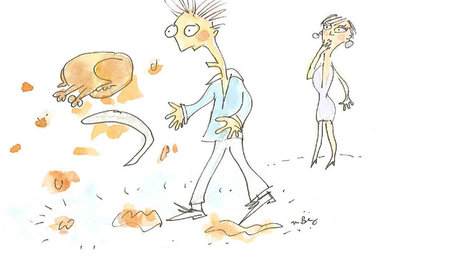when to toss bills, etc.
pammyfay
16 years ago
Related Stories

DECLUTTERING10 Types of Clutter to Toss Today
Clear the decks and give the heave-ho to these unneeded items
Full Story
CONTRACTOR TIPSBuilding Permits: When a Permit Is Required and When It's Not
In this article, the first in a series exploring permit processes and requirements, learn why and when you might need one
Full Story
MOST POPULARThanksgiving Tales: When the Turkey Tanks
Houzz readers prove adept at snatching victory from the jaws of entertaining defeat
Full Story
WORKING WITH PROSWorking With Pros: When You Just Need a Little Design Guidance
Save money with a design consultation for the big picture or specific details
Full Story
SELLING YOUR HOUSEHow to Decorate for the Holidays When Your Home Is for Sale
You can make your home appealing to potential buyers and still celebrate the season. Here are 7 tips to keep in mind
Full Story
WINDOW TREATMENTS7 Window Treatments That Can Lower Your Energy Bills
Beautify your windows, keep your home cool and reduce energy use all at once with the right covering
Full Story
FLOORSWhat to Ask When Considering Heated Floors
These questions can help you decide if radiant floor heating is right for you — and what your options are
Full Story
REMODELING GUIDESWhen to Use Engineered Wood Floors
See why an engineered wood floor could be your best choice (and no one will know but you)
Full Story
SELLING YOUR HOUSEFix It or Not? What to Know When Prepping Your Home for Sale
Find out whether a repair is worth making before you put your house on the market
Full StoryMore Discussions











western_pa_luann
duluthinbloomz4
Related Professionals
Appleton Custom Closet Designers · Bethesda Custom Closet Designers · Ossining Custom Closet Designers · Severna Park Custom Closet Designers · Whittier Custom Closet Designers · Glen Cove Custom Closet Designers · Appleton Interior Designers & Decorators · California Home Builders · Converse Home Builders · Griffith Home Builders · New River Home Builders · Roseburg Home Builders · South Hill Home Builders · Yorkville Home Builders · Ossining Carpentersjannie
talley_sue_nyc
zone_8grandma
jannie
bizzymrs
duluthinbloomz4
jannie
mary_c_gw
neesie
xantippe
talley_sue_nyc
western_pa_luann
catkin
marie26
wantoretire_did